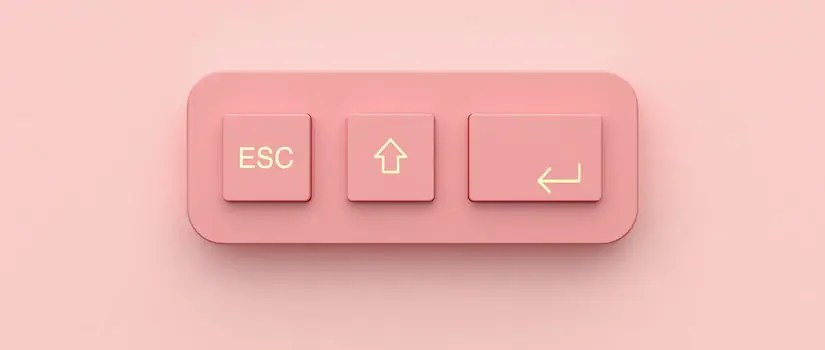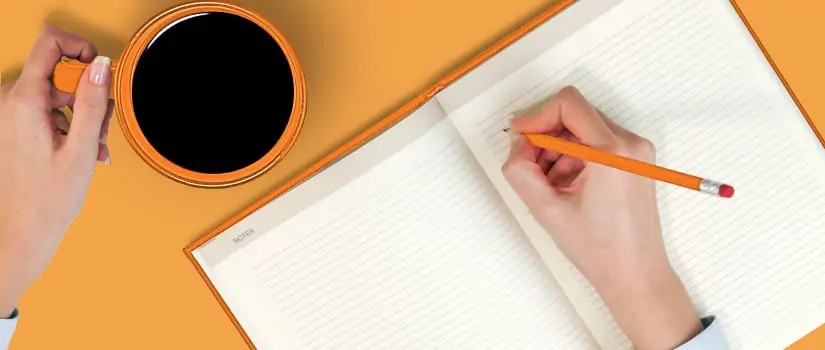
10 Computer Shortcuts to Make Your Life Easier
Spending time on the computer is a reality of doing schoolwork. You spend many, many hours each week on computers completing assignments, sending emails, maybe binging a series or two, and creating projects. These shortcuts will help you save a little bit of time while you’re working — maybe you’ll even get to know your computer a little bit better!
Speaking of saving time, why do citations by hand when BibMe can help you do citations? MLA, APA, Chicago style format, and thousands of other specialized styles are available to help you cite dozens of source types quickly and accurately.
1. Send emojis from your computer
Sending emojis from a phone is pretty easy, but finding them on a computer can be more complicated. Use this command when you want to add a little fun to whatever you’re doing on your computer.
Apple: Control + Command + Spacebar
Windows: WIN + ; or WIN + . (period)
2. Add a hyperlink
Hyperlinks are useful when you want to direct someone else to sources for an assignment, pages they need to read, forms they need to complete, or even videos you think are funny. They make your page look less cluttered, too, so learning these commands could certainly come in handy.
Apple: Command + K
PC: Ctrl + K
3. Print the current document
Learning the print command is incredibly useful and also very simple. Bonus tip: if you go to print options on your computer, you can also save a document as a PDF instead of printing it! When your document is a PDF, it can be easier to edit, add a signature to it, crop it, or make any other changes.
Apple: Command + P
PC: Ctrl + P
4. Add the degree symbol
Lab reports are a real pain when you have to constantly use special characters. Learning the shortcut for the degree (°) symbol should save you some time when working on those science assignments.
Apple: Option + Shift + 8
PC: Alt + 0176 or Alt + 248
5. Creating something new
If you need a new window, document, or version of whatever app you are using, this is the command for you! If you are working on a paper and need to open up another document, or you need to search for something on the Web but don’t want to disturb your current window, then use this simple shortcut.
Apple: Command + N
PC: Ctrl + N
6. Search within a document or webpage
When you find yourself looking for a specific word or phrase within a webpage or document, the search command will be your best friend. It can save you tons of time by preventing you from searching line by line through a big jumble of text.
Apple: Command + F
PC: Ctrl + F
7. Refresh the page
Sometimes pages don’t load properly or need to be updated to show new information. Use this shortcut instead of clicking on the address bar a million times and hoping that something magical happens.
Apple: Command + R
PC: Ctrl + F5
8. Close all current tabs
There is no better feeling than closing out all of your tabs after you’ve finished a long assignment that required a lot of research. If you use this command, you can exit out of all of your tabs with one quick motion!
Apple: Command + Shift + W
PC: Ctrl + Shift + W
9. Screenshot a selected area
Taking a screenshot of your current activity on your computer can be very useful if you need to save something and reference it later. This command will let you not only take a screenshot, but also let you select the range of the screen that you want in the frame.
Apple: Command + Shift + 4
PC: WIN + Shift + S
10. Save your work
Nothing hurts more than losing an assignment on your computer because you forgot to save it. Instead of manually clicking File → Save every time you want to keep your current progress stored on your computer, get in the habit of using this shortcut. Its simplicity will make it harder for you to forget to save it!
Apple: Command + S
PC: Ctrl + S
Now that you’ve learned the ropes, try out these shortcuts the next time you have a writing assignment or just want to send a note to a friend online. You’ll thank yourself after you learn them, and you can even show off your computer skills to your friends as you become the new computer productivity expert.
Use the BibMe plagiarism checker to protect yourself from unintentional plagiarism, and check out their free writing guides to see a research paper example and to review nitty-gritty grammar topics like prepositional phrases, possessive nouns, and conjunctive adverbs, too.
...
5 Writing Hacks to Kick-start Your Next Paper
We’ve all been there: you’re assigned an essay, you turn on your computer, and then you sit in front of a blank screen for 20 minutes. You ask yourself, “Where do I even begin?”
There are times you might feel stuck or completely overwhelmed by a prompt. That’s okay! It happens to everyone, but fear not! By using one of these hacks, you’ll kick-start your next paper in no time.
Sometimes just playing with words can kick-start ideas for your writing. BibMe.org has fun and comprehensive grammar guides that cover everything from demonstrative pronouns and examples of adverbs to the definition of interjection!
Hack #1: Make a brain map
Instead of focusing on writing, draw! It can be boring to look at a monolith of words. By making a brain map, you can identify what ideas, keywords, and sources you’ll want to potentially include in your paper.
There are a lot of ways to make a brain map. One method is to write the prompt in the center. From there, write any associated ideas around the prompt, and then connect these ideas to the prompt with a line. Continue drawing branches out from each idea, adding examples, arguments, connections, and sources. By the end of your brain mapping session, you’ll have a sense of how various ideas connect.
Hack #2: Type headlines into your document
Outlining is a common tool in essay writing and an impactful way to organize your paper. An outline allows you to get a sense of the flow of your paper, and to see if you’re connecting ideas in a way that makes sense. But sometimes, you might feel like your outline isn’t fully fleshed out or that you need to write a thorough outline before you can start writing.
A hack you can use to get around that feeling is to type headlines for the main ideas you want to include in your essay. By typing in all your headlines first before typing, you can use them as guideposts for your paper and ensure that you’re happy with the overall structure.
Your headers can just be key phrases or something more structured like “Main Idea 1: ____.” As you type, you can see how much you need to write for each section, and you’ll slowly but surely fill in the gaps.
Check out a BibMe research paper outline example for inspiration!
Hack #3: Don’t write in order
Speaking of filling in the gaps, there’s no rule that says that you must write your introduction first. An effective way to kick-start your paper is to write the section you feel most confident about first. Once you have that section down, it’ll be easier to write the rest of your paper.
One caveat about this hack is that you do need to ensure that your paper flows nicely before you submit it. Be sure to carve out some time at the end to review your paper’s overall flow.
Hack #4: Use citation tools
Citation tools are an awesome way to kick-start your next paper. By knowing that you have a way to ensure that your writing is up to par, you can focus on creating a rough draft that effectively analyzes ideas and arguments. Afterwards, you can use a paper checking tool to improve sentence structure, check for unintentional plagiarism, and more! Using citation tools allows you to completely keep your initial focus on the meat of your paper.
BibMe.org creates citations automatically in thousands of styles, including APA reference format, MLA citation format, and Chicago citation format, too!
Hack #5: Write with a pen and paper
Nowadays we’re so used to typing that sometimes we forget that we can also write with a pen and paper. If you’re feeling stuck, a hack you can use to kick-start your paper is to start writing your essay by hand. As you write by hand, don’t worry about re-writing: just focus on getting some words down onto paper.
This hack is effective because it’s easy to delete words or phrases as we type. Though convenient (can you imagine using a typewriter to write your essays?), it’s too easy to self-edit. Convenient self-editing means you don’t get to see your progress. With a pen and paper, however, you can see how many words you’re actually creating yourself. Sure, you may not use every single word, but you have physical evidence of your progress. And that can be enough to get you writing!
And those are five writing hacks you can use to kick-start your next paper! Happy writing!

7 Books You Have to Read Over Summer Break
Summer break is the perfect time to catch up on pleasure reading. After all, the school year can be so exhausting with papers, projects, and tests that it can be almost impossible to add more to your reading load. Now that you have a break, it’s the perfect time to sit back, relax, and dive into one of these books below. For best results, grab your sunglasses and a cool glass of water and enjoy your summer reading outside in the summer breeze.
Know what else is a breeze? Creating references with the BibMe.org MLA citation generator or APA generator. There are other bibliographic resources, too, including an automated plagiarism checker and a guide on what is an annotated bibliography. Check them out today!
1. Where’d You Go, Bernadette? By Maria Semple
This book is hilarious and heartwarming at once. It tells the story of a 15-year-old narrator, Bee, and her architect mother that turns up missing right before a family vacation to Antarctica. Soon to be made into a movie, this book is the perfect summer read. The story is told through a series of different artifacts, like emails or conversations, and you just won’t be able to put it down.
2. The Handmaid’s Tale by Margaret Atwood
You might have heard of this book from the its adaption into the hit TV series of the same name. The Handmaid’s Tale is a dystopian work that explores feminist themes like women’s independence. This would make for a great read in a group setting – after you all read the book, you can watch the show together and discuss which you preferred.
3. Between the World and Me by Ta-Nehisi Coates
Often included on college required reading lists for incoming students, this book is a must for young people. The book’s style is that of a letter written to the author’s son about his experiences with racial conflict in America. The account is autobiographical, and it recounts Coates’s own personal history of his upbringing in Baltimore. This book has been heralded as one of the most important narratives about race in our time, and reading it is super insightful for a young person.
4. Bel Canto by Ann Patchett
This book is pretty unexpected in a lot of ways: it tells the story of a group of high-profile businesspeople, diplomats, and an opera singer who are taken hostage by a group of young terrorists. Throughout the novel, some unexpected relationships form, and some of the characters even fall for each other. This exciting novel is full of subtle action, and it serves as a great beach or poolside read.
5. The Opposite of Loneliness by Marina Keegan
The Opposite of Loneliness is a compilation of short stories, poems, and non-fiction pieces by Marina Keegan that was published posthumously, as the author died only a few days after her graduation from Yale. The pieces are witty and strikingly capture what it’s like to be young and searching for love, a career, and meaning in life. This is a perfect book to read cover to cover and pass to a friend to share the experience.
6. Less by Andrew Sean Greer
This 2018 winner of the Pulitzer Prize in Fiction is a real gem – it explores topics like same-sex relationships, love, and getting older through the character of Arthur Less, a gay writer. Despite writing about rather serious themes, Greer finds a way to make the humor shine through the book, making it deeply human.
7. Becoming by Michelle Obama
Becoming is former first lady’s memoir about her own upbringing and her journey to the White House. She tells her own personal history, gives details about her family, and describes the major transition of her husband winning the presidency. This book gives great insight into one of the most prominent figures of our time’s experiences in an intimate way.
By now, I bet you’re feeling the urge to crack open one of these amazing books! Now that the weather is great and your school work load is light, there’s no better time to get started on this list. To make things even better, share with friends and start your own book exchange. You’ll be so happy at the end of the summer when you look at all of the amazing books you’ve gotten to read.
Looking to strengthen your grammar skills this summer? The BibMe grammar guides could be a good place to start! Find guides that explain what a pronoun is, how to use a prepositional phrase, the difference between a proper and common noun, and more!

10 Words You’ll Want to Cut Out of Your Next Paper
One of the best tricks for improving your writing is to take a look at the vocabulary you use. As you advance and become a better writer, your choice of words should continue to improve and become more versatile and sophisticated as well. Along the way, there are a few words that you should seriously consider cutting down on using – or cutting out altogether!
1. You
In everyday speech, we use the second person quite often, either to directly address someone or to represent an amalgamation of any readers or people other than the writer/speaker. For informal writing or something addressed at a specific reader (like this blog article!), it’s okay to use. However, in formal writing, the use of “you” (pronoun) and its variations will weaken the essay. “You” is too informal for academic or business writing, and “you” sentence constructions (i.e., “you can see that X is true”) are less decisive than simpler sentences (i.e., “X is true”).
2. Really/Very
“Really” (adverb) and “very” are the supermarket cupcakes of descriptive words: they’ll do the trick, but they’re so bland and non-specific that nearly any other word would be an improvement. There are plenty of other words that can be used to intensify a noun or adjective without having to resort to that boring old “very” or “really.”
3. Sort of
When you’re writing an essay, you want to sound authoritative on your topic of choice – that’s the entire point, right? “Sort of” undercuts your knowledge from the get-go: it’s a wishy-washy phrase that creates wiggle room where you don’t want there to be any. If you need to describe an ambiguous situation, try for a more specific description of that particular ambiguity. Note: this goes for other variations like “kind of” as well!
4. Just
This is the perfect example of another wishy-washy weasel word that allows a writer to be non-committal or downplay their own points. Whenever you’re tempted to insert “just” into a sentence, resist the urge and read the sentence without “just” in it. Does it still make the same point you intended? Great. If not, it might be one of those rare moments where “just” is actually necessary (to make a contrast, perhaps); in that case, you have full permission to use it.
5. Irregardless
There’s one very good reason not to use this word: it’s not actually a word. As a writing instructor, even at the college level, this was quite possibly the single most common word-choice mistake I saw. “Regardless” is the word you’re looking for; “irregardless” does not exist.
Spare yourself (and your professors/classmates/bosses) the awkwardness.
6. Thing
Much like “really” and “very,” “thing” is a wildly non-specific word that isn’t bad but can be replaced by an infinite number of more specific, more interesting words. Within an academic context, there’s rarely a situation where “thing” (noun) is a better word that some other, more particular noun.
7. Any conjugation of “to go”
This one pops up most often in creative writing, but it may show up in professional or academic work as well. Think about it: what kind of images or connotations does “went” or “goes” conjure up? It’s pretty generic. For instances where you need to convey movement or change, find a different, more vivid word – it’ll give you the freedom to embrace all the connotations and subtle cues that a basic word like “goes” doesn’t have.
8. Amazing
“Amazing” (adjective) has two major downsides. One: it’s become very informal language. It’s the sort of word you might use to enthusiastically describe a meal or a movie to your friends, but it feels like it doesn’t quite fit into a more formal context. The other problem: it’s so common that it’s been watered down. “Amazing” is used so often that it doesn’t have the strength you’re probably looking for.
9. Always/Never
Your parents might have already taught you this one, albeit in a different context. “Always” and “never,” unless statistically accurate from your own research or from a source you cited in your annotated bibliography, have the opposite problem of many of the words on this list: they’re too specific and box you into a statement that is absolute. In reality, absolutes are rare, so not only do “always” and “never” create weak or amateurish writing, but they’re also probably inaccurate.
10. Literally
In its actual definition, there’s nothing inherently wrong with “literally” (adverb) – it’s a great way to express contrast with something figurative. In reality, especially in recent years, “literally” has, ironically, become a figurative expression itself and is too often used as a deliberate exaggeration or a verbal tic.
While you’re improving your writing, make sure your references are included and correct. BibMe.org can help with APA citations, MLA works cited, a plagiarism definition, and more!

6 Habits That Could Be Hurting Your Mental Health
A little bit of stress is a normal fact of life for pretty much everyone. But when your stress or worry becomes overwhelming, it’s time to change up habits. While some health concerns obviously need to be addressed by a professional, there are plenty of small changes you can make that have the potential to make a big difference. You might not even realize it, but these six habits could be messing with your mental health:
Do you have a research paper due soon? No need to stress — BibMe.org has your back! There are resources like an APA citation maker, MLA citing forms, and guides that cover Chicago format and annotated bibliographies, too. Visit BibMe.org today!
Sleep habits
Okay, we’ve all been there: not getting enough sleep while you’re finishing a big project or stressed about an interview or rehearsals. If it happens once in a while, that’s no big deal. The harm comes when you start making your “normal” sleep habits bad ones. Not getting enough sleep – and yes, pulling all-nighters to cram for a test – is actually really bad for your brain and your overall well-being.
It’s not just about the hours, either. The concept of “sleep hygiene” basically helps you develop good behaviors around sleep so that you can get the most rest and benefits. Make small changes:
- skip caffeine and heavy
- hard-to-digest foods in the hours before sleep
- turn off your digital devices
- start a small pre-sleep routine to teach your body to wind down
These practices can help you get a more restful sleep, which translates to a more refreshed and alert day!
Avoiding exercise
When you feel crummy, the last thing you want to do is exercise. The truth is, though, that exercise might be the best thing you could do. Getting physical movement going, whether you like weights, running, dancing, or yoga, is the key here. Not only does exercise help you feel better physically, but it’s a great outlet for stress and frustration. When your body is strong, your mind is stronger too!
Time management
Getting your schedule under control is one of the best ways to start feeling like you can tackle other things in your life. It’s easy to fall into habits of procrastination, poor scheduling, or overcommitting yourself, and then your stress just gets compounded when it feels like you never get anything done.
Instead, find a time management system that works for you. Do you like color-coded digital schedules? Do you like writing out your to-do list by hand on a pretty day planner? A neat and sleek to-do checklist? Figure out what works best for you, divide up your time – and then work to stick to it. Be sure to schedule in downtime, too, to avoid burnout!
Perfectionism
The pressure to do everything and do it perfectly is everywhere these days. If you spend all your time trying to be perfect, however, it’s going to take a major toll on your health. Pursuing excellence is not the same as overloading yourself in the effort to achieve some benchmark of “perfection.” Focus on effort and excellence instead: set realistic goals, focus on the journey as much as the outcome, and check in with yourself to make sure you’re not pushing yourself too far. You’ll find that your work is much better, and you’re much happier, when you’re not fussing over every single possible mistake.
Over complaining
Sometimes, you just need to vent, and that’s okay. But like many other behaviors, it’s when the complaining becomes a common habit that it gets in the way of your health. Negativity only leads to more negativity, which then gets you spiraling into a pretty miserable mood all the time. If your complaining is something that can be acted upon, try to do that instead. If it’s not something you can change, then allow yourself a set time to vent to yourself, your friend, or your cat, and then redirect your thinking to more positive things. The same goes if someone wants to complain to you: it’s okay to listen or even commiserate briefly, but don’t let your relationships with friends or colleagues become focused on sharing complaints.
Social media
Be honest: how much time do you spend scrolling Instagram or Twitter? It’s probably more than you realize. While social media can be a great way to stay connected, that constant sense of connection is a double-edged sword. Not only does it get in the way of your real, relaxing downtime, it also makes it all too easy to constantly compare yourself to the image that others put out online. Instead of automatically reaching for your phone, try to get away from your devices and enjoy a different hobby some of the time!
-
If you need more stress-relievers, check out the BibMe plagiarism checker and its extensive (and fun!) grammar guides. They cover just about everything for you, including how to use helping verbs, a possessive adjective, and correlative conjunctions. BibMe.org makes citing and writing easier.
...
How Be Your Bestest Self in Every Cover Letter
Graduating felt pretty sweet, but now it’s time to get down to business and find a job. You might already have a general cover letter and resume, but you can’t send the exact same thing to all the jobs you’re applying to. That’s not going to cut it if you want to stand out and land your dream job.
Instead, try these cover letter dos and don’ts to refine that stock cover letter into a customized piece that truly reflects your unique talents.
A cover letter is an opportunity to make your writing pop — BibMe is here to help you stand out from the crowd! Check out their free grammar guides for info about first person pronouns, adverb examples, and an interjection list. Then, give your cover letter a final touch and run it through the BibMe grammar and plagiarism checker and land that dream job!
Do:
Keep it fresh
Write a new/revised cover letter for every job application. You can of course copy and paste a bit between drafts. Just be sure to use the following tips to make it feel tailor-made because a cover letter’s sole purpose is to answer the question: Why am I the best person for this job?
Search keywords
Read over the job description highlighting words specific to the job. Since many employers use software to narrow down huge applicant pools, the more harmony between your cover letter and job description, the better.
Tip: When searching for keywords, think like a search engine. Which words in the job description are most important for finding the right person for the job?
Your homework
Research the company itself. Is there a specific project or recent news about the company that appeals to you? Do they have a reputation for hiring a certain type of person? Incorporating this information in your letter will further prove you are a good fit and demonstrates a genuine interest in the company rather than treating it like one of a million organizations in your application pile.
Think customer service
Ask yourself the question: What can I do for you?
The entire purpose of a cover letter is to highlight the answers to this question. Because you’ve done your research and collected keywords, you know exactly what they are looking for. Now it’s time to match your personal history and strengths with those needs. Think about everything you’ve done from volunteer activities, part-time jobs, or special school projects and match those with the company’s needs.
Don’t:
Don’t go beyond a page
If your job application was a movie, the cover letter would be the trailer. Keep it short, tight and full of the best you have to offer.
Don’t include your GPA
The same can be said for graduation rank or any other school-related metric unless it is perfect and provides a direct correlation to the job itself. Employers know that great students are not always great employees. Focus your limited space on what makes you the best fit for the position.
Don’t let creativity run wild
Resist the urge to use unusual words, fonts, or phrases. They will make you stand out, but unless you are applying for a highly creative job, you will stick out for all the wrong reasons. Focus instead on the experiences and talents you can lend the company.
Don’t go it alone
Your potential employer should not be the first person to set eyes on your cover letter. No matter how diligent and thoughtful you are, there is bound to be a mistake or two hidden between the lines. Your best bet is to ask someone who has been in the workforce to read over your letter to weed out any potential missteps.
A cover letter is a company’s first introduction to you. With a little extra time, care and research, it can also be the very first step toward your dream job.
-
You probably won’t need citations in your cover letter, but BibMe.org is there when you’re ready to research. Whether it’s an APA bibliography or MLA citing you are looking for, thousands of styles to choose from (Chicago format, too!) at BibMe.org. You can also find help on putting together your annotated bibliography.
